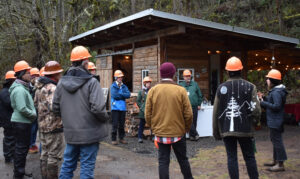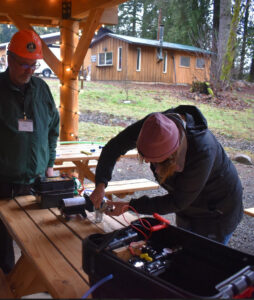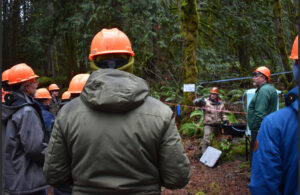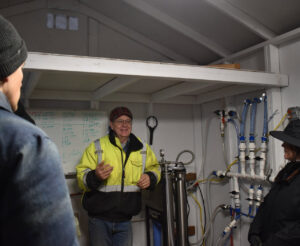Progress report for WPDP24-007
Project Information
An urgent need exists to train extension agents in the Pacific Northwest (PNW) on how to assist small farmers developing commercial tree sap procurement and processing operations to make maple syrup and other sap-based foods from regional orchard, managed forest, and wildland forest trees (e.g., Acer, Betula, Juglans, and Fabus spp.). Currently research and development (R & D) is primarily focused on bigleaf maple (Acer macrophyllum), a fast growing, abundant western PNW tree that can produce large volumes of nutrient rich sap that can be tapped in winter. Procurement and processing techniques are largely the same across edible sap trees. Interdisciplinary R & D projects at OSU, the addition of maple and walnut syrup to the Oregon cottage industry Farm Direct law, and heightened regional media and public attention on sugaring opportunities, are driving a high level of commercial production interest from regional farmers and agroforesters. Technological advancements and lower costs for equipment like reverse osmosis (for sap concentration), and vacuum tubing systems (for efficient sap collection), along with growing regional, national, and global demand for natural sweeteners, have made the PNW trees with edible saps an increasingly economically viable options for farmers with tree stock or new orchard space. The PNW tree sap-based natural foods sector is growing rapidly with many farmers introducing or readying products for the marketplace. Based on frequent queries to OSU, WSU, and UW researchers at public in-person and online webinar events, and through email and phone calls, extension agent training is a readily apparent need. Improving extension capacity will help deliver educational materials, provide learning opportunities, and to convey practical advice such as: basic site assessment, required equipment, Good Agricultural Practices, licensing requirements, and market opportunities for farming tree sap-based foods.
The primary objective of this project is to increase the knowledge of regional extension agents and other professionals that provide education and training to agricultural landowners through field training on the procurement, processing, and marketing of edible sap-based tree products like maple syrup. Farmers need a range of informed advice to help understand variables, mitigate risk with new farm products, and generally improve their odds of success. For example, a farmer might ask:
- Do I have the right abundance of trees on the right slope?
- How does sugaring fit into my farm planning?
- Should I collect by bucket at each tree or with a vacuum tubing system?
- How do I set up different procurement systems correctly?
- What tools are needed for sugaring and how are they used safely?
- How do I manage a sugaring operation alongside an elk herd?
- How do I keep sap from spoiling in collection tanks and then transport it to a processing point?
- Should I be using propane, wood, or another fuel type for evaporation?
- How do I manage my trees for tapping alongside other farm products?
- What are the food safety considerations for the products I want to make?
- How do I clean and properly store a system between tapping seasons?
- How can we set up a sugaring collective or cooperative between farmers in my area?
- What other types of products and markets are there for sap-based products other than syrup?
A second objective is to improve the capacity of extension offices and other professional development agents (e.g., community college farm program development coordinators) to incorporate sugaring information and opportunities into their existing county events (e.g., fairs, workshops, conferences) and to create or foster sugaring specific special events like maple festivals.
Develop a project timeline that includes major milestones of the project with estimated dates. For each milestone, indicate participants and expected outcomes. A Gantt chart may be used.
Background information on the training opportunity, a poll, and follow-up registration invitation will be distributed in June of 2024 and 2025, eight months in advance of the training days. Preparation including site visits, meeting with participants, and development of training materials will occur Jun-Oct 2024. Training will be conducted in February of 2024 and 2025. Based on field experience and feedback after each training the curriculum will be revised and revised copies given to participants. A digital version will be maintained post project to incorporate new research findings. Revised versions will be provided to trainees for free as they occur. A post site visit will occur in 2024 and 2025 after each training to do any necessary clean-up and debrief with the hosts.

[ click to enlarge GANTT table ]
Cooperators
- - Producer
Education
This project train's trainers. We are using an immersive field training approach supported by experts and materials. We have completed our first training and are continuing to work on written and video materials agents can use with their constituents to prepare for the winter 2026 maple sugaring season. In the first training participants learned about the emerging Pacific Northwest maple sugaring industry in the context of the older, more extensive Northeast North American maple sugaring industry. Participants experienced maple sugaring operations at different scales, learned to use common industry tools, and learned about key equipment and setup structures.
Education & Outreach Initiatives
To develop a curriculum and support materials to train extension agents on how to support county constituents interesting in becoming commercial maple syrup producers.
The first training of extension agents was held 01/31/2025 and 02/01.205. Attached is 2025 Training 1 Agenda. The second training in winter 2026 will follow a similar agenda. The training agenda along with written and video support materials will form the basis of a curriculum manual that participants can use to create maple sugaring education and development events in their counties.
This project directly targets extension agents and other professionals that work with small farmers and agroforesters. Participation in the training will prepare them with knowledge and skills necessary to help their constituents participate successfully in the growing PNW sugaring economy. They will become a part of a supportive learning and teaching network that can grow and improve over time similar to other product areas in our region (e.g., hazelnuts, vineyards, forest management).
Constituents (small farm and forest owners) will see improved access to a greatly expanded network of experts whose job it is to assist them with economic development around ecologically sustainable and commercially viable farm products. With the help of extension, the PNW sugaring industry will grow more quickly and efficiently through new entrepreneurial start-ups.
Educational & Outreach Activities
Participation summary:
Learning Outcomes
Project Outcomes
Our team held the first of two, 2-day training workshops to teach OSU and WSU Extension Agents and related professionals the basics of maple sugaring. The first training went exceptionally well and we achieved our broad goal of increasing knowledge of maple sugaring procurement, processing, and marketing of maple sugaring with PNW Extension agents. Participants toured three field sites to meet producers, see different operational scales, learn about essential equipment, and gain hands-on experience with setup tools. In the wrap-up session participants were enthusiastic about the training and incorporating new knowledge into outreach activities in their counties. Of the 16 participants, six responded to a follow-up email survey.
100% indicated being “very satisfied” with the overall workshop experience;
67% indicated they would be “very comfortable” and 33% indicated they would be “somewhat comfortable” sharing the basics of bigleaf maple sugaring.
Participants liked the format with site visits, hands-on training, visits to working sites, and the time for question and answer.
Suggestions for improvements include more information on marketing strategies and a flow chart of tools. A manual is being created for Extension that will include this information.




“This was by far the best train-the-trainer I've ever attended.”
“I loved how we got to see the most basic side of the operation to large and higher tech. I also loved the diversity of stops, the flow of the workshop, and ample time for conversation.”
“Excellent workshop, well run, well planned, and great logistics.”
“I loved the hands-on activities at the pavilion!”